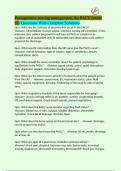Postoperative nursing management, the PACU (exam
#2)/Questions With Complete Solutions
Quiz :What are the 3 phases of recovery that occur in the PACU? -
√Answer :1)Immediate recovery phase: intensive nursing care provided. 2) less
intensive care: patient prepared for self care in PACU or transfer to an
inpatient unit or outpatient unit. 3) exntended care/observation unit: patient
prepared for discharge.
Quiz :What specific information does the OR nurse give the PACU nurse? -
√Answer :overall tolerance, type of surgery, type of anesthetics, results,
complications, I&O's.
Quiz :What should the nurse remember about the patient psychological
equilibrium in the PACU? - √Answer :speak calmly, orient, quiet atmosphere
body alignment, explain, remember hearing is last to go.
Quiz :What are the PACU nurse's priority of concerns when the patient arrives
from the OR? - √Answer :assessment: VS, respiratory status, color, fluid
intake, special equipment, dressing. Positioning of the head to side or lateral
sims.
Quiz :What respiratory functions is the nurse responsible for managing? -
√Answer :airway until gag reflex is ok. position, suction, cough/deep breathe,
O2, mechanical support, check breath sounds, prevent aspirations.
Quiz :What does the PACU nurse monitor regarding fluid status? -
√Answer :blood loss, IV rate, outputs, bladder distention, electrolyte,
hydration, character of drainage, NG tube, N&V.
Quiz :What does the nurse assess on the incisional site? - √Answer :drainage,
record output from drains.
Quiz :when can the client leave the PACU? - √Answer :VS ok, awake, dressings
ok, airway ok.
Quiz :What are signs of a pulmonary embolism postoperatively? -
√Answer :chest pain, dyspnea, increase resp. rate, tachycardia, increased
anxiety, diaphoresis, decreased orientation, decreased BP, blood gas changes.
, Quiz :What are post op complications regarding the urinary system? -
√Answer :urinary retention, unable to void 8-10 hrs post op, palpable bladder,
frequent small amount of voiding, pain suprapubic area.
Quiz :What are signs of hypovolemic shock postoperatively? -
√Answer :decrease urine, decrease BP, weak pulse, cool clammy, restless,
increase bleeding, increase thirst, decrease cvp.
Quiz :What signs of Atelectasis postoperatively? - √Answer :dyspnea,
tachypnea, decrease breath sounds, asymmetrical chest movement,
tachycardia, increase restlessness.
Quiz :What are signs of pneumonia postoperatively? - √Answer :rapid
respirations, shallow respirations, fever, wet breath sounds, asymmetrical
chest movements, productive cough, hypoxia, tachycardia, leukocytosis.
Quiz :What are signs of infection postoperatively? - √Answer :redness
purulent drainage, fever, tachycardia, leukocytosis.
Quiz :What does dehiscence mean? - √Answer :separation of incision.
Quiz :what does evisceration mean? - √Answer :evidence of bowel through
incision. increase pain level
Quiz :What is gastric dilation? - √Answer :nausea & vomiting, abd distention.
Quiz :what is a paralytic ileus postoperatively? - √Answer :decrease bowel
sounds, no stool or flatus, nausea, vomiting, abd distention, abd tenderness.
Quiz :When can you remove the oral airway? - √Answer :when gag reflex
returns
Quiz :What are potentials airway complications of surgery? -
√Answer :hypoxemia: reduced 02 in the blood caused by actelectasis(most
common cause of postoperative hypoxemia), pulmonary edema, aspiration of
gastric contents, pulmonary embolus, laryngospasm & bronchospasm,
hypoventilation.




